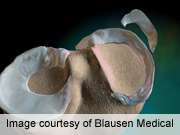Meniscal repair failure about 23 percent after five years

(HealthDay)—The long-term rate of failure after meniscal repair is similar for all techniques, with a pooled rate of 23.1 percent, according to a review published in the Dec. 19 issue of The Journal of Bone & Joint Surgery.
Jeffrey J. Nepple, M.D., of the Washington University School of Medicine in St. Louis, and colleagues conducted a systematic literature review and meta-analysis of 13 studies to investigate the long-term outcomes of meniscal repair at a minimum of five years post-surgery.
The researchers found that the pooled rate of meniscal repair failure, defined as either reoperation or clinical failure, was 23.1 percent, and varied from 20.2 to 24.3 percent based on the status of the anterior cruciate ligament (ACL), the meniscus repaired, and the technique utilized. Failure rates were similar for the medial (24.2 percent) and lateral (20.2 percent) meniscus and for those with an intact or reconstructed ACL.
"A systematic review of the outcomes of meniscal repair at greater than five years postoperatively demonstrated very similar rates of meniscal failure (22.3 to 24.3 percent) for all techniques investigated," the authors write. "The outcomes of meniscal repair at greater than five years postoperatively have not yet been reported for modern all-inside repair devices."
One or more authors disclosed financial ties with an entity in the biomedical arena.
More information:
Abstract
Full Text (subscription or payment may be required)
Copyright © 2012 HealthDay. All rights reserved.















